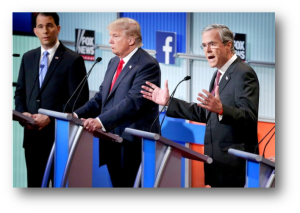These past two debates were the most important to date, as they will be the last before Iowa and New Hampshire have their primaries, starting the election process. For the Republican Candidates on Tuesday, the debate was their last effort to break out of the field and have a shot at the nomination. For the democrats, it was another shot for Bernie Sanders to get an advantage over Clinton, or for Martin O’Malley to be remembered by anyone two months from now. However, for the major importance of these debates, both had the unfortunate outcome of being good showings for everyone, effectively neutralizing the differences between candidates. However, the most important result of the debates was a significant differentiation in the candidates. Basically, most of the members of a party have a standard set of policy positions which all the candidates share. This results in most debates being a competition of who can champion of the interests of the average voter the most. However, at last ditch debates like these candidates who are behind are forced to show the differences between them and the rest of the pack, in the hopes that the party will chose their viewpoint over the other candidates. There were four major sparring matches between candidates in the last two debates: Trump vs Bush on professionalism, Paul vs Christie on foreign policy, (both have which have occurred before and are nothing new) Cruz vs. Rubio on immigration, and Sanders vs Clinton on foreign policy.
Trump vs Bush has been a constant debate since Trump entered the race. Bush thinks Trump is ruining the image of the republican party, and Trump thinks Bush should just give up. Both are somewhat right. The Paul vs Christie fight was the usual spatter over government surveillance. Sanders vs. Clinton was an attempt to emphasize the few tangible differences in their policy, but hasn’t changed much about the race. For Sanders to succeed, he needs to win New Hampshire if not Iowa, both of which he is losing in. However, the newest conflict is that between two people who are considered by many pundits to be the most likely to win the Republican primary, Ted Cruz and Marco Rubio. They battled over immigration, an issue in which Rubio is much more moderate than his fellow Republicans. Cruz pounced, and chastised Rubio for the perceived weakness.
Rubio as a whole took a lot of flak in the debate, more than any other candidate. It’s easy to imagine why; although he is not doing well in the polls, he is highly popular and considered to be the most electable candidate. However, he doesn’t lead in the key early states, and the first primaries are only a month away.


